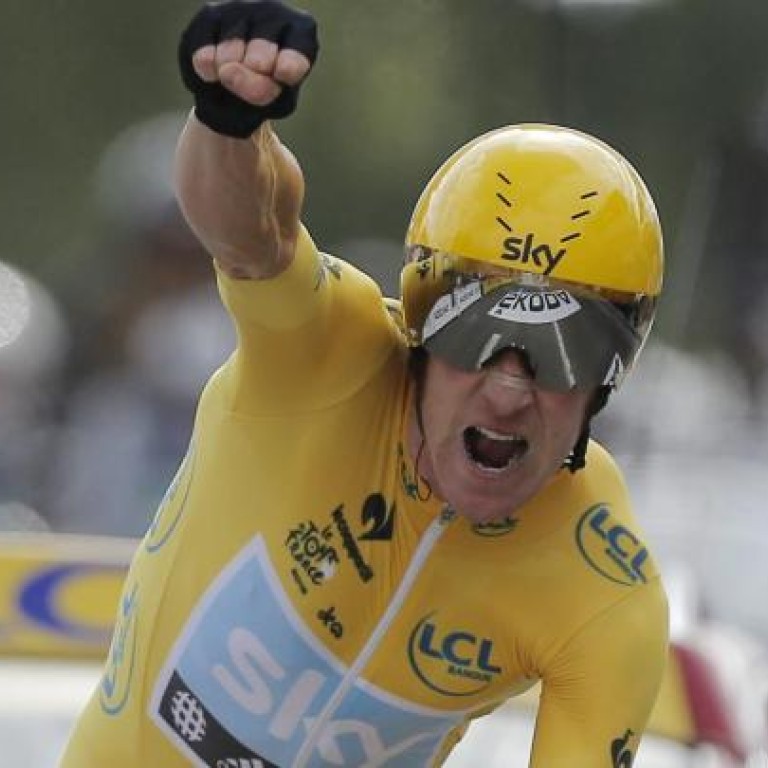
Cycling battles to repair doping damage
This year's Tour winner, Bradley Wiggins, and last's year's victor, Cadel Evans, must lead the way in repairing the damage of the Armstrong era
As doping-disgraced Lance Armstrong cycles into the sunset of sporting infamy, Britain's Bradley Wiggins and a new generation of riders must try to make people care about a tainted sport.

Where Armstrong had been listed as champion of the world's most famous cycling race from 1999-2005, there is no winner named, organisers choosing not to move up other riders into the top spot, symbolic of a lost era.
Another former Armstrong teammate, Norwegian Steffen Kjaergaard, admitted on Tuesday that he took the banned blood booster erythropoietin (EPO).
With already-ousted winner Floyd Landis also among confessed Tour dope cheats and an entrenched banned performance-enhancing system around Armstrong, Rabobank dropped its team sponsorship, declaring the sport was too far gone.
Wiggins, this year's Tour de France winner with Team Sky, and 2011 champion Cadel Evans of Australia are among the stars who must try to convince sponsors and supporters to stay faithful in the face of betrayal.
"We are the ones picking these pieces up," Wiggins told Sky News. "For me it is about moving forward and not looking back any more to what happened 10, 15 years ago.
"We are one of the most successful sports for catching people. I don't think that is relevant to what we are doing today. What we are doing today is setting the example for our sport."
Sky said they would ask all team members to sign a pledge vowing they have never been involved with doping and never will be - or face dismissal
"We want a team in which riders are free of the risks of doping and in which fans new and old can believe without any doubt or hesitation," Sky said.
Michael Ashenden, a blood doping expert who worked for UCI until April, said Sky's pledge must be enforced with effective oversight and standards to be meaningful.
"Do Sky intend to actively investigate what [team leader David] Brailsford calls reputational risks and act on what they find if there are grounds to suspect someone has been associated with doping?" he asked.
"It's a really important issue because unless they can qualify their position, their statement isn't worth the paper it's written on.
"If they intend only to act when a cyclist is sanctioned, they're being disingenuous to their fans.
"We're talking about millions of fans being deceived and tens of millions of dollars being fraudulently earned by Armstrong. Lessons have to be learned."
Brailsford said slower Tour times in recent years show the doping era is over.
"Times have got slower and slower, which contrasts the normal progression of sport," Brailsford said. "There's only one explanation and it's that the sport has cleaned up. People are doing a lot to make sure all the results can be authentic."
Showing the depth of past disgrace, however, erodes confidence in the stars of the moment and threatens the future.
The Onion, a satirical faux news website, summed up the Armstrong affair in a story entitled, This Last Story Ever Written About Cycling, with cutting remarks basically wondering why cycling should even bother trying to ride on.
The tongue-in-cheek report said Armstrong's punishment ensured "cycling will never be mentioned in a mainstream news publication again, because, what's the point?... Lance Armstrong is done and cycling is over.
"According to sources and basic common sense, now that the storied career of cycling's most prominent and marketable figure has been revealed as a complete and undeniable fraud, there is no chance the sport will ever again receive even one line of coverage from any news outlet in the world."
What if they staged a Tour de France and nobody cared?
Well, what if Wiggins won Britain's first Tour de France title then took London Olympic gold in the road time trial and the big cycling story of the year was an ageing US drugs cheat?
British rider Chris Hoy, a six-time Olympic champion, is unhappy that one famous cheat can smear the efforts of all who race without resorting to doping.
"It's very sad," he told the BBC. "We do it clean, we put in years and years of effort and make sure we have the correct diet and rest properly. We don't go out drinking. You sacrifice a lot and then you win a gold medal.
"But there will be a percentage thinking, 'Well, I wonder if there was drugs involved in that performance'?"
